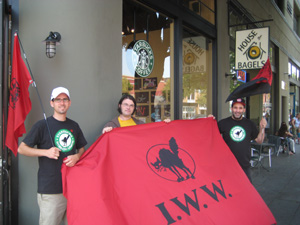Starbucks facing third anti-union case in Michigan
Submitted on Wed, 01/07/2009 - 4:29pm
Disclaimer - The opinions of the author do not necessarily match those of the IWW. The image pictured to the right did not appear in the original article, we have added it here to provide a visual perspective. This article is reposted in accordance to Fair Use guidelines.
 Starbucks is to begin proceedings Wednesday in a third case in which it
allegedly fired a barista because of his union activities.
Starbucks is to begin proceedings Wednesday in a third case in which it
allegedly fired a barista because of his union activities.
By Melissa Allison, January 6, 2009 - Seattle Times business reporter
The union lumps keep coming for Starbucks, which was thumped by the
National Labor Relations Board (NLRB) last month for unfair labor practices at
several New York cafes.
Last week, the company settled a separate NLRB dispute in Michigan and on
Wednesday is to begin proceedings there in a third case in which it allegedly
fired a barista because of his union activities.
All three cases were initiated by baristas affiliated with the Industrial
Workers of the World (IWW), a century-old union that has worked for several
years to improve conditions for Starbucks workers.
In New York, an administrative-law judge with the NLRB said last month that
work rules were unfairly imposed on employees who supported the union. The
coffee chain was ordered to give back jobs to three former workers and
compensate them for lost earnings. The company also must post notices informing
employees of their labor-organizing rights.
Starbucks plans to appeal the ruling, according to spokeswoman Tara
Darrow.
Such appeals often take a year and might last longer now that the NLRB's
board has lost three of its five members, said University of Tennessee law
professor Jeff Hirsch, a former attorney at the NLRB.
Last week's settlement stemmed from a complaint that barista and IWW member
Cole Dorsey made to the Michigan Occupational Safety and Health Administration
about a leaky air conditioner.
In interviewing at least one Starbucks worker about the matter, attorneys
at a local law firm representing Starbucks neglected to issue legally required
warnings that help prevent coercive questioning.
"We contend that these warnings are not necessary when dealing with an
occupational safety charge. The NLRB disagreed," Darrow said in an e-mail. "We
elected to settle the matter to avoid litigation."
Starbucks did not admit wrongdoing but must post a notice in the affected
store in Grand Rapids "saying they won't do it again," said NLRB Regional
Director Stephen Glasser.
Dorsey, the barista who complained about the air conditioner, was fired in
June after working for Starbucks almost two years. The NLRB charges that he was
dismissed because of his union activities.
He was fired eight months after Starbucks and the IWW settled an agreement
over unionizing efforts by employees at his Grand Rapids store. At that time,
Starbucks agreed to post notices in that store advising employees of their
unionizing rights.
Such settlements never come with fines and rarely with admissions of
wrongdoing. The Employee Free Choice Act, which stalled in the last session of
Congress, would allow the NLRB to order fines in some situations, according to
former NLRB attorney Hirsch. The bill faces strong opposition from the business
community.
In October, Starbucks settled a similar complaint in Minneapolis regarding
another employee who claimed he was fired for encouraging co-workers to join the
IWW.
In Dorsey's case in Michigan, Starbucks has not settled. The case will be
heard by administrative-law judge Eric Fine.
Melissa Allison: 206-464-3312 or [email protected]